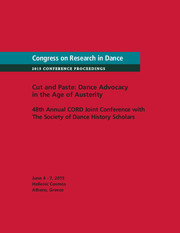No CrossRef data available.
Article contents
The Beginning of Dance Studies in Greece (1900–1974)
Published online by Cambridge University Press: 02 August 2016
Abstract
The educational system introduced in Greece during the liberation, a period known as the Bavarian Regency (1833–1862), had been, more or less, a copy of the corresponding German system of this period. Koula Pratsika (1899–1984), who established modern dance and professional dance studies in the country, participated in the Delphic festival in 1927 and was influenced by Eva Palmer. She also had been influenced by the 1930s Hellenistic ideology writers and artists. Pratsika was trying to find and develop a dance reflecting Greek tradition, revitalized and encouraged by the ancient spirit. She was inspired by Duncan regarding ancient dance as well as by many aesthetic movements, including German modern dance and the Dalcroze School where she studied. Pratsika invited German dancers to give seminars and performances in Athens. This paper will examine the birth of Greek modern dance since the beginning of the twentieth century and the influence of German culture and dance.
- Type
- Research Article
- Information
- Copyright
- Copyright © Vasso Barboussi 2016




